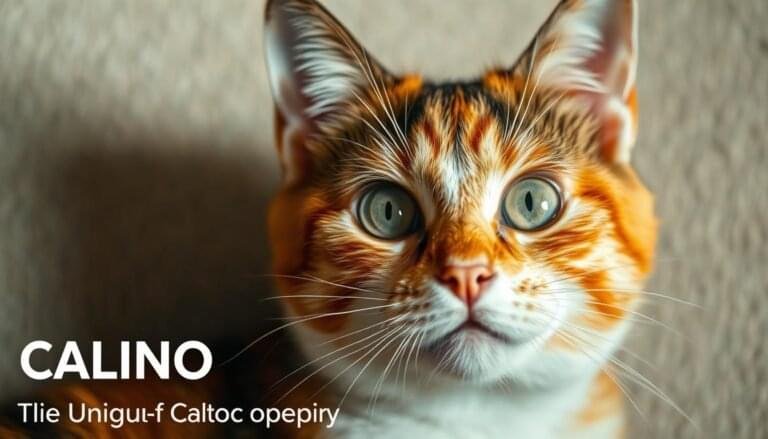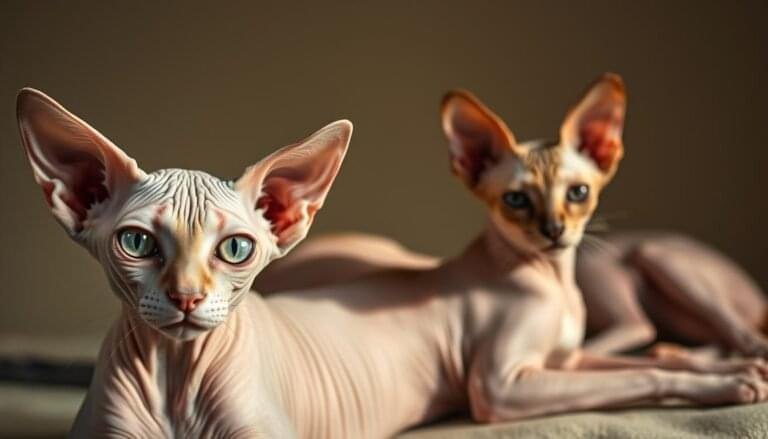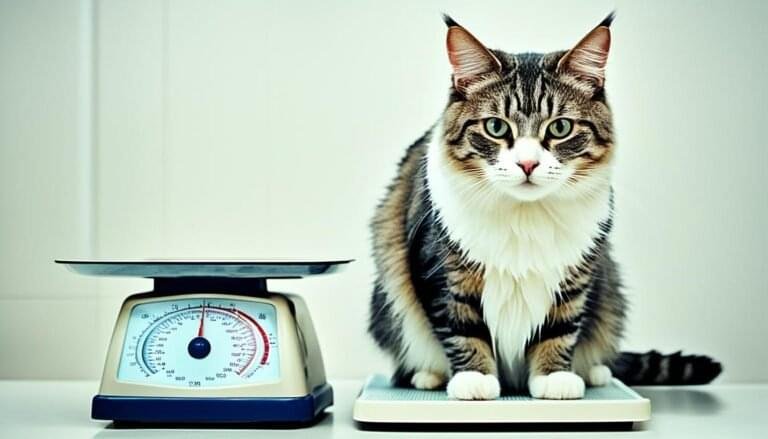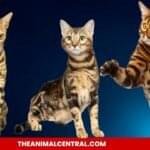Did you know that the Savannah cat is considered one of the largest domestic cat breeds in the world? It’s true! These magnificent felines are a hybrid of the African serval and domestic cats, resulting in a stunning and unique breed that captivates cat lovers around the globe.
Key Takeaways:
- The Savannah cat is an exotic breed that combines the African serval’s wild beauty with the domestic cat’s affectionate temperament.
- Savannah cats are known for their large size, striking appearance, and playful nature.
- The breeders of Savannah cats have extensive knowledge and expertise in producing these magnificent felines.
- Savannah cats require a high-protein diet, regular veterinary care, and responsible ownership practices.
- Legal restrictions and regulations may apply to owning a Savannah cat, so it’s essential to check local laws before bringing one into your home.
The History and Development of the Savannah Cat Breed
The Savannah cat breed has a fascinating history that began in 1986 with the birth of the first kitten, named “Savannah.” This unique breed is a result of crossing a domestic cat with an African serval, creating a captivating combination of wild and domestic traits.
The breeders behind the development of the Savannah cat have extensive knowledge and experience in feline breeding and behavior. With a deep understanding of genetics and a graduate degree in animal sciences, they have dedicated over 20 years to perfecting this extraordinary breed. Their dedication and expertise have resulted in the creation of some of the most striking and sought-after cats in existence.
It’s important to note that reputable Savannah cat breeders are registered with The International Cat Association (TICA). This registration ensures that the breeders adhere to TICA’s strict standards, guaranteeing the highest-quality domesticated companions.
The Savannah cat has allowed people to bring a part of the wild into their homes. With the African serval mix, these cats retain the beauty, athleticism, and elegance of their wild counterparts. However, they are also more manageable and bonded, making them suitable companions for families and individuals alike.
Different Generations and Classification of Savannah Cats
Savannah cats, with their unique combination of African serval and domestic cat genes, are classified into different generations based on their proximity to their serval ancestor. These generations play a significant role in determining the appearance and temperament of Savannah cats.
F1 Savannah: The F1 generation is the first generation of Savannah cats and is produced by breeding an African serval with a domestic cat. These cats have the highest percentage of serval genes, resulting in a closer resemblance to their wild serval ancestors both in appearance and temperament.
F2 Savannah: The F2 generation is produced by breeding an F1 Savannah with a domestic cat. While still exhibiting serval-like characteristics in terms of appearance and temperament, F2 Savannahs have a slightly lower percentage of serval genes compared to F1s.
SBT Savannah: The SBT (Stud Book Tradition) Savannah is at least four generations removed from the serval. These Savannah cats have a more predictable appearance and temperament due to their further genetic dilution. SBT Savannahs are known for displaying the desirable traits and characteristics of the Savannah breed.
The appearance and temperament of Savannah cats can vary depending on their generation. While F1 and F2 Savannahs closely resemble their serval ancestors, SBT Savannahs exhibit traits that have been consistently refined through selective breeding. It is important to consider these generational differences when choosing a Savannah cat.
Advantages of Different Savannah Cat Generations:
- F1 Savannahs: Strong serval-like appearance and temperament, ideal for owners seeking a close resemblance to the wild serval.
- F2 Savannahs: Retains serval traits, but with a slightly lower serval gene percentage, making them a more manageable option for households.
- SBT Savannahs: More predictable appearance and temperament, reflecting the desired traits of the Savannah breed, making them a popular choice for companionship.
Disadvantages of Different Savannah Cat Generations:
- F1 Savannahs: May exhibit stronger wild instincts and require additional socialization and training.
- F2 Savannahs: Can still display some wild traits, requiring experienced owners who are familiar with the breed.
- SBT Savannahs: Less serval-like appearance and temperament compared to earlier generations, which may not meet the expectations of individuals seeking a closer resemblance to the serval.
The Unique Characteristics and Personality of Savannah Cats
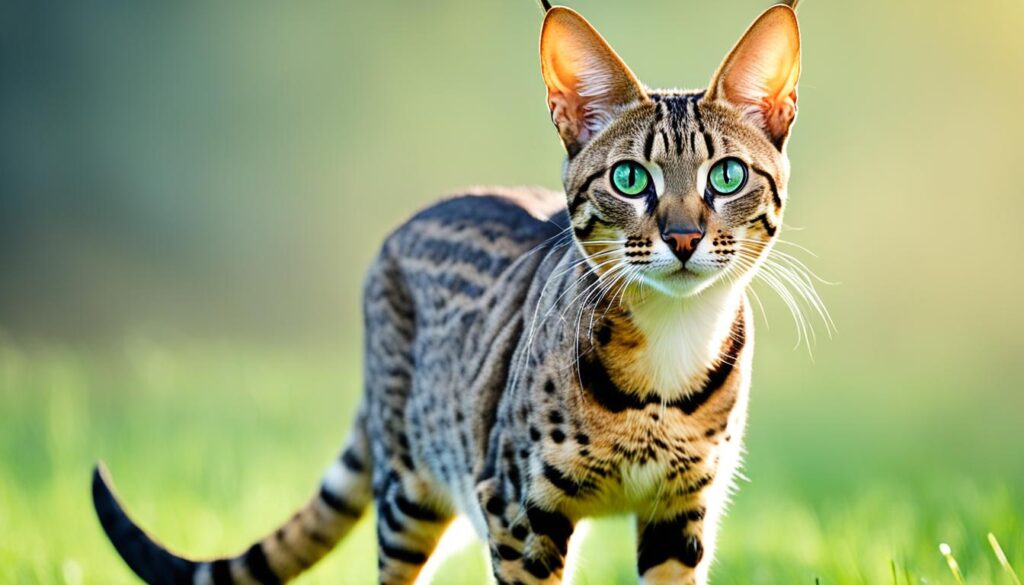
Savannah cats possess a range of distinctive qualities that make them truly one-of-a-kind. From their physical attributes to their temperament, these feline companions stand out among other breeds.
First and foremost, Savannah cats have a long, slender neck that adds to their elegant appearance. Their triangular heads and large, wide-set ears give them a distinct and captivating look.
What further sets them apart is their longer-than-average legs, which contribute to their unique size. With their elongated limbs, Savannah cats appear larger and more impressive compared to other domesticated felines.
As descendants of the African serval, Savannah cats inherit strong hunting instincts. This characteristic makes them highly skilled predators. However, it’s important to note that their hunting instincts may not make them suitable for households with small pets.
Despite their wild appearance and hunting abilities, Savannah cats exhibit a mild temperament. When properly socialized as kittens, they can get along well with other cats, dogs, and humans. These cats have the potential to form strong bonds and become loyal companions to their human families.
Key Characteristics of Savannah Cats:
- Long, slender neck
- Triangular head
- Large, wide-set ears
- Longer-than-average legs
- Strong hunting instincts
- Mild temperament
If you’re seeking a feline companion with a striking appearance and a captivating personality, the Savannah cat is an excellent choice.
In the next section, we’ll explore the dietary needs of Savannah cats and how to ensure they receive proper nutrition for optimal health.
The Diet and Nutritional Needs of Savannah Cats
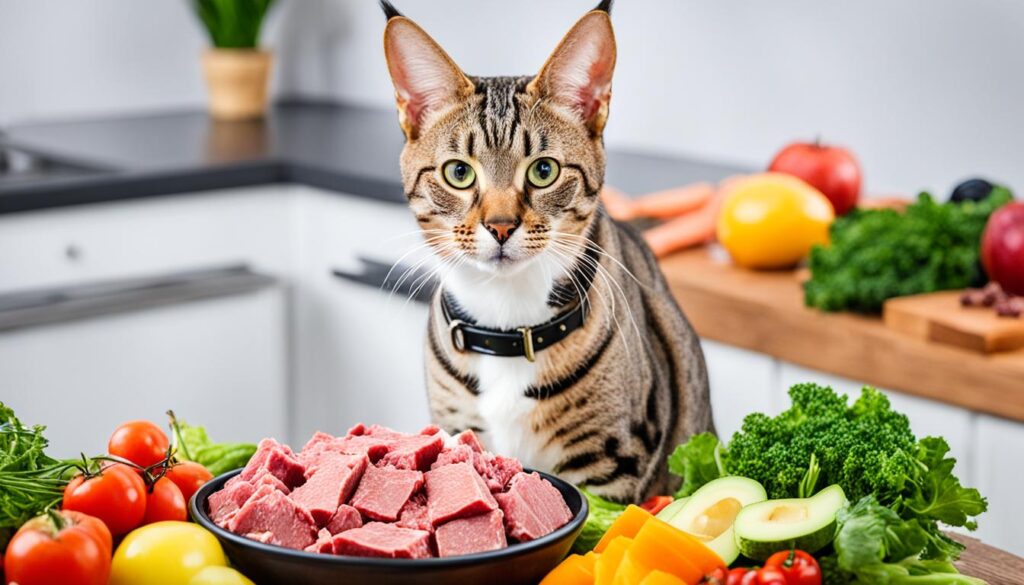
Savannah cats have specific dietary requirements that must be met to ensure their health and well-being. A balanced and nutritious diet is crucial for these exotic felines, providing them with the energy and nutrients they need to thrive.
One of the most important aspects of a Savannah cat’s diet is a high protein content. As obligate carnivores, Savannah cats need a protein-rich diet to support their muscle development and maintain overall health. Look for cat food products that contain a high percentage of quality animal-based proteins, such as chicken, turkey, or fish.
A combination of wet and dry food is recommended to provide variety and meet different nutritional needs. Wet food has a higher moisture content, which helps keep the cat hydrated and promotes healthy urinary tract function. Dry food, on the other hand, can help maintain dental health by reducing plaque and tartar buildup. It’s important to choose high-quality cat food brands that meet the nutritional standards set by regulatory bodies.
Another option to consider is adding raw meat to your Savannah cat’s diet. Raw meat can provide additional nutrients and mimic the natural diet of wild cats. However, it’s crucial to consult with a veterinarian or animal nutritionist to ensure you are offering a balanced and safe raw food diet.
When selecting cat food for your Savannah, be sure to avoid products that contain corn. Cats have difficulty digesting corn, and it may contribute to digestive issues. Opt for cat food without corn and other fillers to provide the optimal nutrition your cat needs.
Maintaining proper hydration is essential for Savannah cats. Always provide fresh water in a clean bowl and ensure it is easily accessible for your cat. This helps prevent dehydration and supports overall health and well-being.
Meeting the dietary needs of Savannah cats is crucial to their overall health, vitality, and longevity. By providing a high-quality, protein-rich diet with a balance of wet and dry food, and the occasional inclusion of raw meat, you can ensure your Savannah cat receives the nutrients they need to thrive. Don’t forget to always provide fresh water to keep them hydrated and healthy.
Care and Health Considerations for Savannah Cats
When it comes to the care and health of Savannah cats, there are a few important considerations to keep in mind. While this exotic breed is generally known for its good health, there are still some potential health issues to be aware of.
One such condition that Savannah cats are at risk of developing is hypertrophic cardiomyopathy, which is characterized by thickening of the heart muscle. To mitigate this risk, responsible breeders conduct thorough health screenings to ensure that their cats are free from any conditions that could negatively affect the breed.
In terms of veterinary care, it’s important to note that Savannah cats may have heightened sensitivity to certain medications due to their serval ancestry. This means that special precautions need to be taken during veterinary treatment, and it’s crucial to work with a veterinarian who is experienced in caring for hybrid cats.
Declawing is strongly discouraged for Savannah cats. Not only is it considered inhumane, but it can also lead to long-term health and behavioral problems. Instead, providing appropriate scratching alternatives and regular nail trimming are recommended to protect your furniture without causing harm to your pet.
Typical Health Considerations for Savannah Cats
| Health Consideration | Guidelines |
|---|---|
| Hypertrophic Cardiomyopathy | Regular health screenings by responsible breeders |
| Veterinary Care | Consultation with a veterinarian experienced in caring for hybrid cats |
| Declawing | Discouraged due to long-term health and behavioral issues |
By prioritizing the health and well-being of Savannah cats through responsible breeding practices, regular veterinary care, and proper medication protocols, owners can ensure that their beloved pets enjoy a happy and healthy life. Remember, it’s important to always prioritize the welfare of these exquisite felines and provide them with the care they deserve.
Information on Vaccinations and Vet Care for Savannah Cats
Ensuring the health and well-being of your Savannah cat is of utmost importance. Proper vaccinations and regular veterinary care play a crucial role in maintaining your cat’s overall health. Here’s essential information about vaccinations and vet care for Savannah cats:
Vaccinations
Savannah kittens should receive vaccinations to protect them from common feline diseases. Some of the key vaccinations include:
- Rhinotracheitis: This vaccine protects against feline herpesvirus-1, which can cause respiratory and eye infections.
- Calicivirus: Vaccination against calicivirus helps prevent respiratory infections and oral ulcers.
- Panleukopenia: This vaccine provides protection against feline panleukopenia, a highly contagious viral disease that affects the gastrointestinal system.
- Rabies: Rabies vaccination is essential for the overall protection of your Savannah cat and to comply with legal requirements.
It is important to consult with your veterinarian to determine the appropriate vaccination schedule for your Savannah cat, as it may vary based on factors such as location, age, and lifestyle.
Veterinary Care
Regular veterinary care is vital for monitoring your Savannah cat’s health and detecting any potential issues early on. Additionally, it is important to inform your veterinarian that your cat is a hybrid breed to ensure they are prepared and knowledgeable about the specific needs and potential risks associated with Savannah cats.
Consultations with the breeder’s veterinarian can provide valuable insights into the breed’s specific health considerations. Their expertise and experience with Savannah cats can help guide you in providing the best care for your feline companion.
During surgical procedures, it is necessary to use specialized anesthesia protocols designed for exotic or hybrid cats. These protocols take into account the unique physiology of Savannah cats and help ensure their safety and well-being during anesthesia and surgery.
Responsible Ownership and Legal Considerations for Savannah Cats
When considering owning a Savannah cat, it is important to understand the legal restrictions that may apply due to their hybrid status. Savannah cats are considered hybrid cats because of their African serval heritage. As a result, there may be specific laws and regulations pertaining to owning and keeping these exotic feline companions, depending on your location.
To ensure compliance with the law, it is crucial to consult with the local fish and wildlife department or relevant authorities in your area. They can provide you with information on the legal restrictions, permits, and regulations associated with owning Savannah cats. These laws can vary from state to state, county to county, and even city to city, so it is essential to stay informed about the specific requirements in your region.
By adhering to the local regulations, you can ensure that you are a responsible owner and provide a safe and suitable environment for your Savannah cat. It is also important to note that laws and regulations may change over time, so it is crucial to stay up-to-date with any updates or modifications that may impact the ownership of these unique feline companions.
Responsible ownership not only involves complying with legal restrictions but also includes providing proper care, socialization, and attention to your Savannah cat’s physical and emotional well-being. Creating a loving and secure environment, following veterinary guidelines, and maintaining regular veterinary care are essential aspects of responsible ownership for any pet, including Savannah cats.
Remember, being a responsible owner goes beyond legal obligations. It is about providing the best possible care and ensuring the health, happiness, and overall welfare of your Savannah cat throughout their lifetime.
Key Considerations for Responsible Ownership
- Research and understand the legal restrictions and regulations in your area regarding Savannah cat ownership.
- Consult with the local fish and wildlife department or relevant authorities to obtain accurate and up-to-date information.
- Comply with the requirements, permits, and regulations governing the ownership of hybrid cats.
- Provide a safe and suitable environment for your Savannah cat’s physical and emotional well-being.
- Ensure regular veterinary care, vaccinations, and appropriate medical interventions for your cat’s health.
- Engage in proper socialization and training to foster a strong bond with your Savannah cat.
- Offer a balanced diet, high in protein and tailored to your cat’s nutritional needs.
- Keep your cat indoors or provide a secure and supervised outdoor area to prevent any potential harm or risk.
- Participate in ongoing education and stay informed about the latest research, guidelines, and best practices for Savannah cat ownership.
Conclusion
The Savannah cat is a truly unique and captivating exotic feline breed. With its striking appearance that resembles the African serval, it is no wonder that these cats capture the attention and hearts of many. From their long legs and large ears to their wild coat patterns, Savannah cats are truly a sight to behold.
In addition to their remarkable appearance, Savannah cats also boast a loyal and manageable temperament. Despite their wild ancestry, these cats can form strong bonds with their human families and adapt well to their surroundings. However, it is important to note that their hunting instincts may make them less suitable for households with small pets.
When considering a Savannah cat as a pet, it is essential to provide them with the proper care and environment they need. This includes a high-protein diet, regular veterinary care, and responsible ownership practices. Additionally, it is important to be aware of the legal restrictions and regulations that govern the ownership of hybrid cats to ensure compliance and a smooth ownership experience.
In conclusion, the Savannah cat is an exotic feline breed that offers a combination of unique appearance and loyal temperament. By embracing responsible ownership and providing the necessary care, these fascinating cats can bring joy and excitement to any household.
FAQ
What is a Savannah cat?
What makes Savannah cats unique?
Are Savannah cats suitable for households with small pets?
What kind of diet do Savannah cats need?
Are Savannah cats prone to any health conditions?
How should I care for a Savannah cat?
What vaccinations do Savannah cats need?
Are there legal restrictions on owning Savannah cats?
References
| International Cat Association (TICA) | https://www.tica.org/ |
| The Cat Fanciers’ Association (CFA) | https://cfa.org/ |
| World Cat Federation (WCF) | https://www.wcf-online.de/ |
| Fédération Internationale Féline (FIFe) | https://www.fifeweb.org/ |
| Wikipedia | https://en.wikipedia.org/wiki/Savannah_cat |

